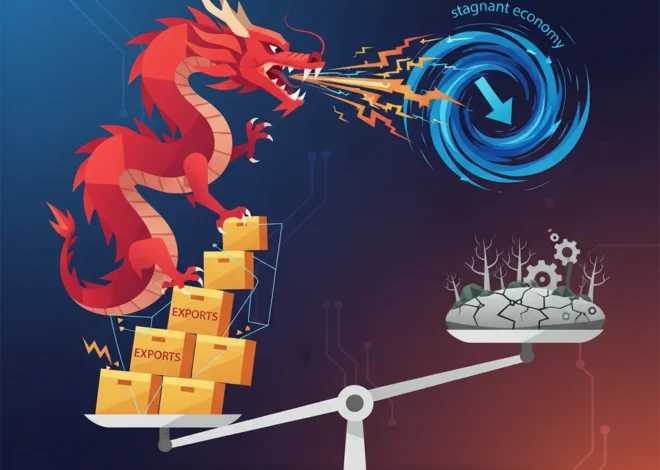
Beyond the Rhetoric: Decoding the Economic Warfare Between China and Japan
In the intricate ballet of global geopolitics, sometimes the most significant moves are not the loudest. They are the quiet cancellations of flights, the sudden “safety” warnings for travelers, and the postponed cultural events. These seemingly minor administrative actions are, in fact, the new front line in a rapidly escalating conflict between two of Asia’s largest economic powerhouses: China and Japan. What began as a war of words over the sensitive issue of Taiwan is now metastasizing into a campaign of economic pressure, sending ripples across the global economy and putting investors and business leaders on high alert.
Recent events, as reported by the Financial Times, show Beijing is methodically turning up the heat on Tokyo. The catalyst? A series of statements from high-ranking Japanese officials suggesting that Japan might intervene militarily if China were to attack Taiwan. For Beijing, which views Taiwan as a renegade province, this was a direct challenge to its core territorial claims and a crossing of a critical red line. The response has been swift, calculated, and aimed directly at Japan’s economic nerve points.
The Anatomy of Economic Coercion
China’s strategy is a masterclass in leveraging economic interdependence as a political weapon. Instead of overt, headline-grabbing tariffs, Beijing is employing a more subtle, yet equally potent, toolkit of non-tariff barriers and administrative friction. This approach creates uncertainty and inflicts economic pain without necessarily triggering international condemnation or formal WTO disputes.
The campaign includes a multi-pronged assault on the ties that bind the two nations:
- Travel and Tourism: China has issued heightened travel warnings for its citizens regarding Japan and has reportedly instructed travel agencies to scale back or cancel group tours. This is a significant blow, as Chinese tourists have historically been a pillar of Japan’s tourism industry, known for their high spending.
- Aviation Sector: Major Chinese airlines, including Air China and China Southern Airlines, have cancelled a substantial number of flights to Japan. While some of this is attributed to shifting post-pandemic demand, the timing and scale strongly suggest a political dimension.
- Cultural and Diplomatic Exchanges: Numerous cultural events and academic exchanges have been “postponed” indefinitely. This tactic serves to chill person-to-person relations and signals a broader diplomatic deep freeze, making routine business and political dialogue far more difficult.
To understand the coordinated nature of this pressure campaign, consider the key actions and their intended impact. The following table breaks down Beijing’s recent moves:
| Tactic | Specific Action | Intended Economic & Political Impact |
|---|---|---|
| Travel Deterrence | Issuing travel advisories; instructing agencies to limit tours. | Directly hurts Japan’s tourism, retail, and hospitality sectors. Creates public and business pressure on the Japanese government. |
| Aviation Squeeze | Major Chinese airlines cancelling hundreds of weekly flights. (source) | Reduces business and leisure travel capacity, disrupting commercial ties and further damaging the tourism ecosystem. |
| “Soft Power” Freeze | Postponing or cancelling cultural, academic, and youth exchanges. | Undermines long-term relationship building and fosters an environment of mutual distrust, isolating Japan diplomatically. |
| Official Condemnation | Harsh public rhetoric from foreign ministry officials and state-controlled media. | Signals to domestic and international audiences that Japan is an unreliable and hostile partner, justifying further punitive measures. |
This playbook is not new. China has used similar economic coercion tactics against countries like Australia (over its call for a Covid-19 origin investigation), South Korea (over the deployment of the THAAD missile defense system), and Lithuania (over its engagement with Taiwan). The message is clear: political dissent will have direct and painful economic consequences.
Beyond the Headlines: Why Trump's BBC Spat is a Critical Signal for Investors
Why This Matters for Global Finance and Investing
For investors, traders, and financial professionals, it is tempting to dismiss these events as distant political theater. That would be a grave mistake. The escalating friction between the world’s second- and third-largest economies has profound implications for the global stock market, supply chains, and long-term investment strategies.
The most immediate risk lies within the deeply integrated supply chains. Japan is a powerhouse in high-tech components, specialized chemicals, and advanced manufacturing equipment that are critical to Chinese industry. Conversely, many Japanese corporations, from automakers to electronics giants, rely heavily on both Chinese manufacturing and the vast Chinese consumer market. This tension introduces a new layer of operational and political risk that can’t be easily hedged. A sudden escalation could disrupt the production of everything from smartphones to electric vehicles, with shockwaves affecting companies worldwide.
This uncertainty has a direct impact on trading and market sentiment. Japanese equities, particularly in the tourism and consumer goods sectors, have already shown sensitivity to the news. The broader Nikkei and TOPIX indices now face a geopolitical headwind that complicates analysis based purely on domestic economics. Similarly, multinational corporations with significant exposure to either country must now factor this instability into their earnings forecasts, potentially leading to downward revisions and increased stock market volatility.
The Tech Cold War Heats Up
Beyond the immediate economic fallout, this conflict is an extension of the broader U.S.-China tech rivalry, with Japan caught in the middle. As a key U.S. ally and a leader in semiconductor manufacturing technology, Japan is crucial to Washington’s strategy of containing China’s technological ambitions. Tokyo’s recent moves to align with U.S. export controls on advanced chip-making equipment have already angered Beijing, and the current tensions over Taiwan only add fuel to that fire.
This geopolitical friction is a powerful catalyst for technological and financial decoupling. It accelerates China’s drive for self-sufficiency in critical technologies and reinforces its strategy of building alternative systems outside the Western-dominated financial sphere. The development and promotion of China’s central bank digital currency (CBDC), the digital Yuan, is a prime example. By creating a new infrastructure for cross-border payments, China aims to reduce its reliance on the SWIFT messaging system and the U.S. dollar, insulating its banking and trade from potential Western sanctions. This high-stakes game in financial technology is directly influenced by the type of geopolitical pressure we see being applied to Japan.
Innovations in fintech and even blockchain technology are increasingly being viewed through a national security lens. The ability to control the rails of finance is seen as just as important as controlling shipping lanes. The more China feels cornered by the U.S. and its allies like Japan, the more aggressively it will pursue a parallel technological and financial ecosystem. According to one analyst cited by the FT, Beijing’s actions are a “clear warning” intended to deter other nations from following Japan’s lead in challenging China’s interests (source).
China's "Liquid Gold" Loses Its Luster: What Moutai's Slump Reveals About the Global Economy
Navigating the New Reality: A Forward Look for Business Leaders
The simmering conflict between China and Japan is more than just a regional dispute; it is a microcosm of the new global reality. The era of prioritizing economic efficiency above all else is over. Resilience, diversification, and geopolitical awareness are now the cornerstones of a sound corporate and investment strategy.
For business leaders, this means stress-testing supply chains not just for natural disasters but for politically motivated disruptions. It means diversifying markets and reducing over-reliance on any single country, however attractive it may seem. For those in the world of finance, it requires a new level of diligence, pricing in political risk that is notoriously difficult to quantify but impossible to ignore.
As Beijing continues to refine its tools of economic statecraft, the line between politics and economics will only continue to blur. The cancelled flights and travel warnings are not the crisis itself; they are the tremor before the earthquake. The world is watching to see how Japan responds, and the lessons learned will shape international business and investing for years to come.
The 0 Million Handshake: Decoding Goldman Sachs' Record-Breaking EA Deal


